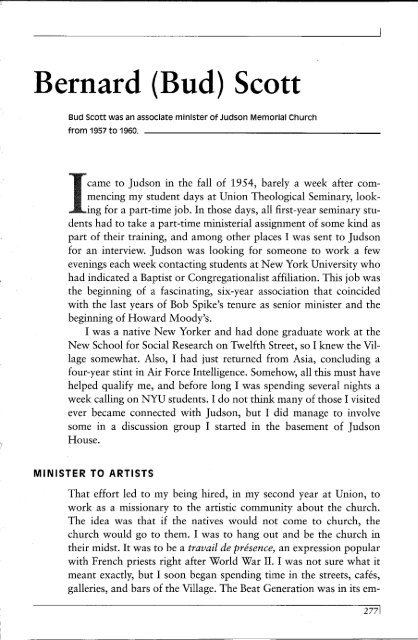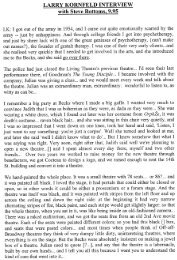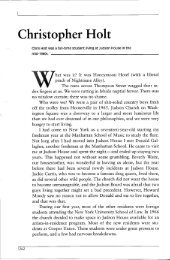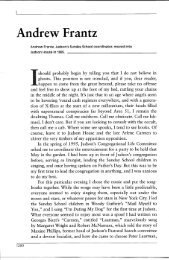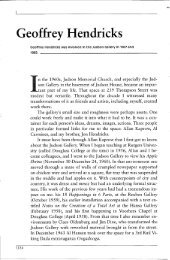Bernard (Bud) Scott - Judson Memorial Church
Bernard (Bud) Scott - Judson Memorial Church
Bernard (Bud) Scott - Judson Memorial Church
Create successful ePaper yourself
Turn your PDF publications into a flip-book with our unique Google optimized e-Paper software.
The <strong>Judson</strong> Gallery on Thompson Street, 1959. Photo by Grace Goodman. Reprinted bypermission.resentational, albeit often Dadaist, images, can be said to have hadone of its roots in the <strong>Judson</strong> Gallery.This is how it happened.Claes Oldenburg, Jim Dine, Marc Ratliff, and I were in the gallerylate one Saturday afternoon. We had just closed Jim Dine's onemanshow and were sitting on the floor with our backs against thewall beneath Jim's paintings. We were wondering what to do next
Unfortunately, almost simultaneously with the appearance ofour first issue, Leon Uris's novel by the same name hit the bookstoresand became an instant best seller.This upset us at first, but therespective readerships were so different that no one seemed to notice.Conceivably, the name even helped us. Exodus was great fun
and the quality of writing, poetry, and art was actually quite good.Daniel Wolf was co-editor, Howard Hart poetry editor, and MarcRatliff art editor. Dan was the founder and editor of the VillageVoice; Howard Hart was a poet of considerable skill and sensitivity(Jacques Maritain called him the "best Catholic poet writing in Englishtoday"); Marc was a gifted young artist who afterward made itbig as a designer in the New York commercial art world; he finallyalso gained recognition as a serious artist.Money for Exodus came from Whitey Lutz, who was married tothe heiress of the Lilly pharmaceutical fortune and who took an interestin the Village culture. They kept an apartment on TwelfthStreet. I went there one day, through the agency of Dan Wolf, andtold them what I had in mind. Not long after, I received a generouscheck that got us started.Launching a little magazine had its unexpected obstacles, chiefof which was the difficulty in getting it circulated. Circulation is usuallyso small that distributors do not want to bother, especially withunknown startups operating on a shoestring, as ours obviously was.Financially, such magazines are almost always losing propositions.There was one lone distributor in the East, out of New Jersey, whohandled "little magazines."One day at my request he came by in a stationwagon filled withbundles of every variety of little magazine imaginable, some recognizable,like Partisan Review, most unheard-of. It was clear that heworked hard for a living. He explained that he was already overcommittedand could not take on any more business. After some persuading,he agreed to take three hundred copies on a one-shot basis. Hopingfor more successthan that, I printed fifteen hundred copies of ourfirst issue. It was not long before this distributor came back askingfor additional copies, first a few hundred more, then another fivehundred. Finally, he wanted five thousand more. More people thanwe had dare dream were picking Exodus off the literary-magazineracks in cubbyhole bookstores all over the country.Unfortunately for us, we could not supply the demand: The typographer'slead had been melted down right after the first printing.No matter, it cost us more to produce the magazine that we could sellit for. Exodus could not last very long on that basis and it did not, althoughthe immediate cause for the quarterly's demise was not financesbut my sudden departure from <strong>Judson</strong> in the spring of 1960.
My years at <strong>Judson</strong> were a vivid, fascinating time, and to thisday they are never far from my consciousness. The friends I hadthen, both in <strong>Judson</strong> and in the surrounding community, continue tomean a great deal to me. I am very grateful for the experience.BUD SCOTTlives in Florida.


